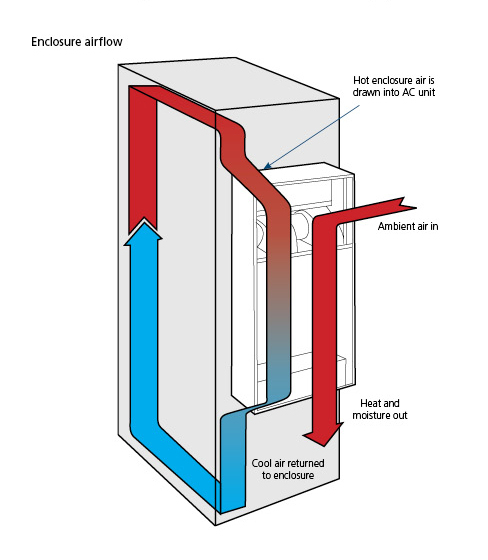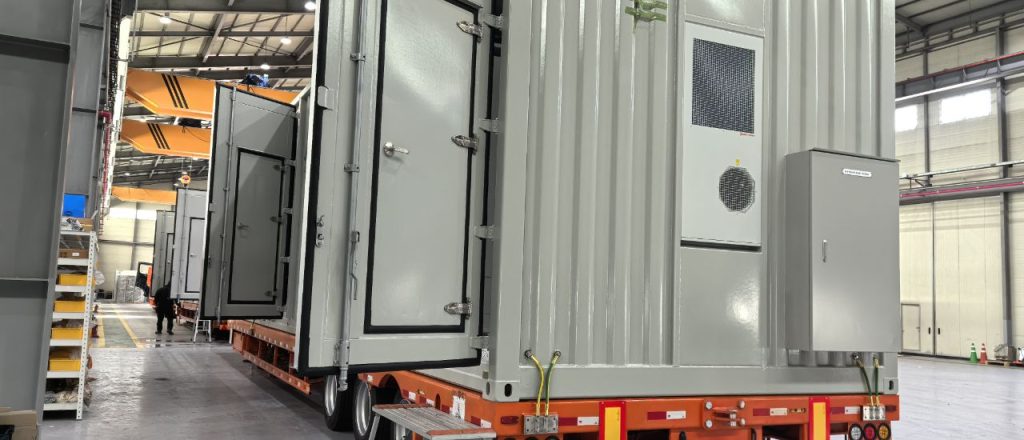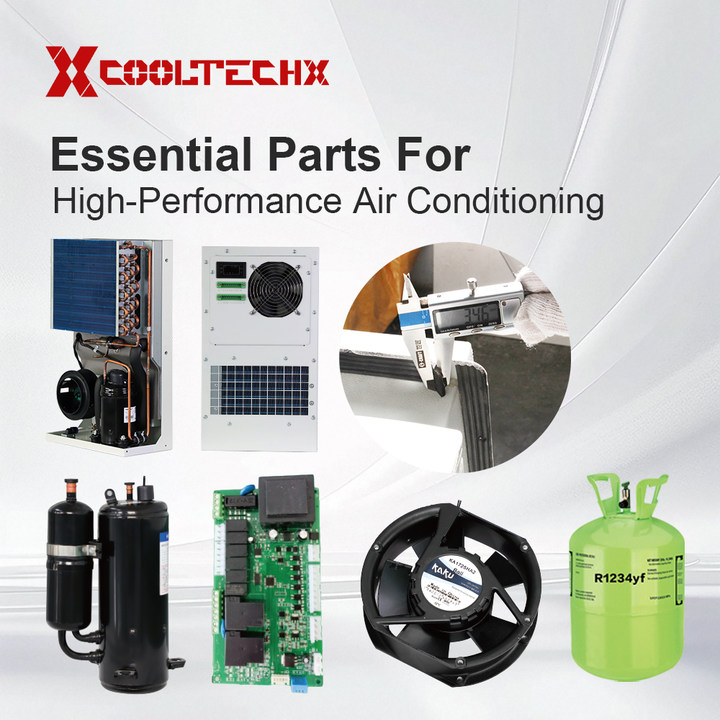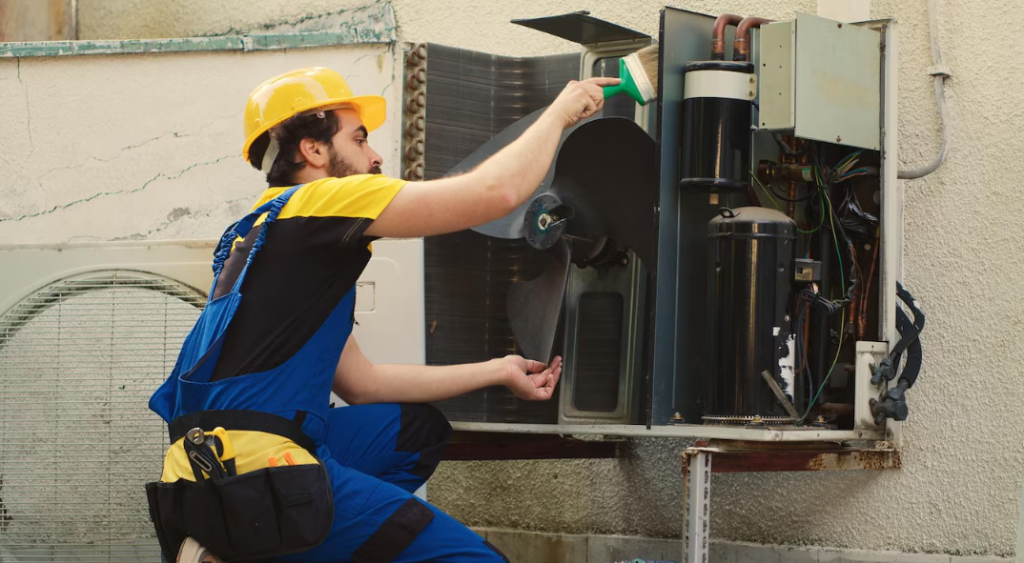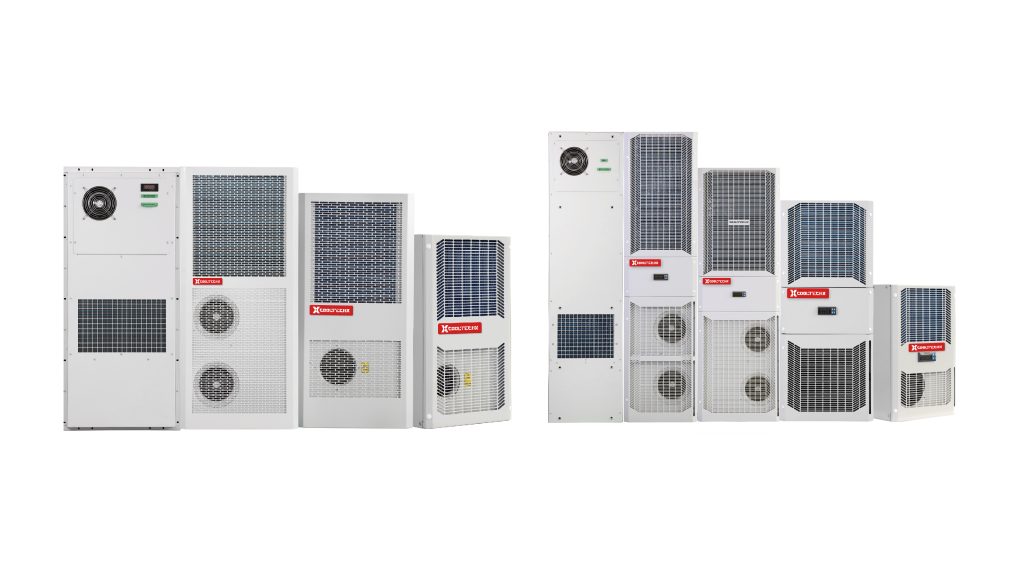
Key Takeaways
- Pick the right cooling power for your equipment. Match BTU ratings to your machines’ heat output for proper cooling.
- Think about cabinet size and heat when choosing an air conditioner. Bigger cabinets with more machines need stronger cooling.
- Clean or change filters often to keep it working well. This easy job saves energy and helps your air conditioner last longer.
- Get professional maintenance once a year. Experts can find hidden problems and keep your air conditioner working smoothly.
- Choose energy-saving models to save money over time. High EER ratings mean better cooling using less electricity.
Why Cooling Capacity Matters for Cabinet Air Conditioners
Understanding Cooling Capacity and Its Role
Cooling capacity is how much heat an air conditioner removes. It’s measured in BTU per hour (British Thermal Units). This tells you how well it keeps your cabinet cool. Machines make heat when they work, and cooling capacity keeps the temperature safe.
For instance, big equipment might need 135,000 to 240,000 BTU per hour. Smaller machines usually need less than 135,000 BTU per hour. Picking the right size stops overheating and helps machines work better.
| Equipment Type | BTU Rating Range (Cooling Power) |
|---|---|
| Large Commercial Package | 135,000 to 240,000 Btu per hour |
| Small Commercial Package | Below 135,000 Btu per hour |
Tip: Always check the BTU rating to match your equipment’s heat. This helps your air conditioner cool properly.
Risks of Incorrect Cooling Capacity (Undersized or Oversized Units)
Choosing the wrong size can cause big problems. A small unit won’t cool enough, making the machines overheat. Overheating can break parts and shorten machine life. A big unit cools too fast, wasting energy and causing uneven temperatures.
A small air conditioner works too hard and can’t keep up. A big one turns on and off too much. Both can cost more to fix and have lower efficiency.
Note: Don’t guess the size you need. Use BTUH calculators or follow manufacturer advice to pick the right one.
Signs Your Equipment Needs Better Cooling
Your machines may show signs if cooling isn’t enough. Watch for these clues:
- Frequent overheating: Machines shut down or show temperature error messages.
- Reduced performance: Machines slow down or don’t work as well.
- Physical damage: Parts like wires or boards look burned or worn.
- Unusual noise: Fans or coolers make loud or strange sounds.
If you see these signs, check your air conditioner. Getting the right size can stop damage and make machines work better.
Factors to Think About When Picking a Cabinet Air Conditioner
Cabinet Size and Heat Load
Your cabinet’s size and the heat it makes are important. Bigger cabinets with more machines create extra heat. They need stronger cooling power. Smaller cabinets make less heat but still need careful planning.
To figure out the heat load, check how much power your equipment uses. Also, look at how much heat each part creates. This helps you know the cooling power needed to keep things safe.
Tip: Use tools like BTUH calculators and manufacturer guides for accurate heat load numbers.
Indoor or Outdoor Placement
Where you put your cabinet air conditioner changes how it works. Inside spaces usually have steady temperatures. Outside areas can have hot, humid, or sunny conditions. Cabinets outside need air conditioners built for tough weather.
Outdoor units should meet standards like NEMA ratings to handle dust, rain, and heat. Indoor units focus more on saving energy and being quiet.
Note: Check the temperature and humidity of your location before picking a model.
Cabinet Material and Insulation
The cabinet’s material and insulation affect how it handles heat. Metal cabinets heat up faster and need stronger cooling. Insulated cabinets keep heat out, making cooling easier.
Pick a cabinet with good insulation to stop heat buildup. If your cabinet isn’t insulated, you’ll need a more powerful air conditioner.
Tip: Look for cabinets with thermal barriers or coatings to help cool better.
Power Supply and Energy Efficiency
The power supply of your cabinet air conditioner is very important. Check the voltage and phase your equipment needs before buying. Most units use common voltages like 120V, 240V, or 480V. Using the wrong voltage can harm the unit or make it work poorly. Always match the air conditioner’s power with your electrical setup.
Energy efficiency helps save electricity and money. Efficient air conditioners use less power but cool well. Look for models with high EER (Energy Efficiency Ratio) ratings. A higher EER means better cooling with less energy. This is useful if your equipment runs all the time or you cool many cabinets.
Think about features like smart controls or variable speed compressors. These adjust cooling based on how much heat there is. They help save energy and lower costs over time. These features also make the air conditioner last longer.
Tip: Pick an energy-efficient air conditioner to save money and protect equipment.
Finally, think about the total cost over time. Energy-efficient models may cost more at first, but save money later. They use less energy and need fewer repairs. Choosing the right unit gives you good cooling and long-term savings.
Calculating the Right Cooling Capacity
Understanding Heat Load and Equipment Needs
To find the right cooling power, know your equipment’s heat load. Heat load comes from how much power your devices use and their efficiency. Use this formula to calculate it:
Heat = SystemMaxPower * (1 - efficiency)
This formula shows how much heat your equipment makes. For example, if your system uses 500W and works at 80% efficiency, it creates 100W of heat. This helps you pick a cooling system that handles current and future needs, especially if you add more devices later.
Different locations need different cooling levels because of the environment. For example:
| Location | Cooling Power Needed |
|---|---|
| Location1 | 250W |
| Location2 | 325W |
| Summary | Air conditioners with the same power work differently in hot areas. |
By knowing the heat load, you can avoid picking a unit that’s too small or too big. This ensures your air conditioner works well.
Thinking About Temperature and Humidity
The temperature and humidity around your cabinet affect cooling needs. Hot and humid places make more heat inside the cabinet, needing stronger cooling. Cooler and drier places are easier on the cooling system.
Studies show that air properties like density and heat change with temperature and humidity. For example:
| Property | Value at 300K (26.85°C) | Notes |
|---|---|---|
| Specific Heat (cp,m) | 1.0162 kJ/kg K | Shows how air holds heat under different conditions. |
| Density (ρm) | 1.171 kg/m³ | Helps calculate airflow for cooling systems. |
| Thermal Conductivity (km) | 0.02598 W/mK | Matters more in hotter conditions. |
| Dynamic Viscosity (μm) | 1.903E-05 kg/m s | Changes with humidity, especially in hot and low-pressure areas. |
When choosing an air conditioner, think about where it will be used. Outdoor cabinets need units that handle tough weather. Indoor cabinets may need less cooling but should still consider seasonal changes.
Using BTUH Tools or Manufacturer Advice
BTUH calculators and manufacturer guides make picking the right cooling power easier. These tools use heat load, temperature, and cabinet size to suggest the best option.
Manufacturers often give charts or online tools to match your needs. For example, if your cabinet makes 300W of heat and the room is 85°F, the tool might suggest a unit with 1,000 BTU/hour cooling power.
These tools help you choose accurately and avoid guessing. They also ensure your air conditioner works well and saves energy.
Tip: Always check manufacturer advice for the best match for your equipment and location.
Key Features of an Effective Cabinet Air Conditioner
Energy Efficiency and Cost Savings
An energy-efficient air conditioner saves money and protects equipment. High EER models use less power but cool effectively. This lowers electricity bills, especially for systems running all the time.
Look for features like smart controls or variable-speed compressors. These adjust cooling based on how much heat is present. This reduces energy use and helps the air conditioner last longer.
Tip: Pick an energy-efficient model to save money and help the environment.
Durability and Resistance to Environmental Factors
A strong air conditioner works well even in tough conditions. For outdoor use, choose a unit made for extreme weather. Look for NEMA or IP ratings to ensure protection from dust and water.
Materials like stainless steel or coated metals prevent rust and damage. These materials make the air conditioner last longer. For indoor use, pick units that handle constant operation without wearing out.
Note: Check the product details to ensure it fits your environment.
Compatibility with Cabinet Design
The air conditioner should match your cabinet’s size and design. Measure your cabinet and check its cooling needs before buying. A bad fit can leave gaps and cause poor cooling.
Some models allow side or top installation for better flexibility. Make sure the airflow matches your cabinet’s ventilation system. This ensures the air conditioner works efficiently.
Tip: Follow the manufacturer’s advice to find the best fit for your cabinet.
Noise Levels and Operational Quietness
Think about how loud the cabinet air conditioner is. Noise can affect the area where your machines work. A noisy unit might bother workers or mess with sensitive tools. A quieter air conditioner makes the workspace better and more efficient.
The sound of air conditioners is measured in decibels (dB). Lower dB means less noise. For example, talking is about 60 dB, but a quiet air conditioner runs at 50 dB or less. Check the product details to find a noise level that fits your needs.
Tip: For quiet places like offices or labs, pick models marked “low-noise” or “silent operation.”
Some features help make air conditioners quieter. Variable-speed compressors change speed based on cooling needs, reducing noise. Units with soundproof materials or insulated panels also lower noise levels.
- Why Quiet Operation Helps:
- Makes workspaces calmer and more focused.
- Avoids problems with sound-sensitive tools.
- Lowers stress from constant loud sounds.
If the air conditioner is for outdoor use, noise might not matter as much. But for indoor spaces, quieter models are a good choice. You can also place the unit farther from work areas to reduce noise.
Note: Make sure the unit is quiet but still cools well. A quiet air conditioner should meet your cooling needs.
Choosing a quieter air conditioner improves the workspace and protects your machines.
Installation, Maintenance, and Long-Term Performance
Correct Placement and Mounting
Put your cabinet air conditioner in the right spot. Make sure air can move around it easily. Don’t block vents or place it near heat sources. For outdoor cabinets, pick a shady spot to avoid direct sunlight.
Attach the air conditioner tightly to stop it from shaking. Use brackets or mounting kits made for your unit. Follow the manufacturer’s instructions to install it properly. Bad placement can cause uneven cooling and poor performance.
Tip: Check the mounting area often to keep it secure and in good shape.
Cleaning and Changing Filters Regularly
Clean or replace filters often to keep the air conditioner working well. Dust and dirt can block filters, making it less efficient. Clean filters every few months or replace them when needed.
Regular maintenance has these benefits:
| Benefit | What It Does |
|---|---|
| Saves energy | Clean systems use less power, lowering energy bills. |
| Fewer breakdowns | Regular care stops problems and reduces repair costs. |
| Lasts longer | Maintenance helps the air conditioner work for more years. |
| Better air quality | Clean filters improve air, stopping mold and dirt buildup. |
Keeping filters clean saves money and protects your machines. It also makes the air healthier for your workspace.
Note: Set reminders to check filters so you don’t forget this important task.
Watching Performance and Fixing Problems
Keep an eye on your air conditioner to spot issues early. Listen for strange sounds, check for uneven cooling, or notice if energy bills go up. These could mean clogged filters or worn-out parts.
Track how well it works over time. If cooling gets weaker, look for damage or wear. Fix small problems quickly to avoid expensive repairs later.
Tip: Have a professional inspect your air conditioner once a year to keep it reliable.
Watching and fixing problems early helps your air conditioner last longer. It also keeps your equipment cool and running smoothly.
Scheduling Professional Maintenance
Regular professional maintenance keeps your cabinet air conditioner working well. You can clean and check it yourself, but experts handle harder tasks. Hiring professionals helps find hidden problems and keeps cooling system efficient.
Why Professional Maintenance Matters
Technicians have special tools and skills to check your air conditioner. They look for worn parts, refrigerant leaks, or electrical issues. If ignored, these problems can cause expensive repairs or equipment failure.
Tip: Get professional maintenance once a year to catch problems early and make your air conditioner last longer.
What Happens During a Maintenance Visit
During a maintenance visit, technicians do important checks:
- Clean inside parts: Dust and dirt can make the unit less effective.
- Check refrigerant levels: Low refrigerant hurts cooling performance.
- Test wires: Loose or broken wires can cause problems.
- Review performance: Experts make sure the unit cools properly.
These steps help your air conditioner work better, save energy, and avoid damage.
Benefits of Professional Maintenance
Professional maintenance has many benefits:
- Better reliability: Regular checks stop sudden breakdowns.
- Energy savings: A clean unit uses less electricity.
- Longer life: Care helps the air conditioner last longer.
- Less worry: You can focus on your equipment without cooling problems.
Note: Keep a record of maintenance visits to track how well your air conditioner is doing.
Scheduling professional maintenance protects your air conditioner and keeps your equipment safe and cool.
Picking the right cabinet air conditioner keeps your equipment safe. It also helps machines work better and last longer. Think about things like cabinet size, where it will be used, and how much energy it uses. For example, knowing the power supply type and figuring out the heat load can help you choose the right model.
Use tools like BTUH calculators or ask experts to find the right cooling power. Cleaning filters and getting professional check-ups keep the air conditioner working well. These steps save energy, cut costs, and make your equipment last longer.
Tip: Match the air conditioner to your cabinet’s size, material, and purpose for the best results.
FAQ
1. How can I tell if my cabinet air conditioner fits?
Match the cooling power (BTU/hour) to your equipment’s heat. Use BTUH tools or follow the manufacturer’s advice for correct sizing. The right size stops overheating and cools efficiently.
Tip: Wrong-sized units waste energy or fail to cool properly.
2. Can I use an indoor air conditioner outside?
No, indoor units can’t handle outdoor weather like rain or heat. Outdoor air conditioners have weatherproof features and NEMA or IP ratings for safety.
Note: Always pick a unit made for your cabinet’s location.
3. How often should I clean or change the filter?
Clean or replace filters every 3-6 months based on use. Dusty places may need more frequent cleaning to keep the unit working well.
Tip: Set reminders to check filters to avoid problems.
4. What if my air conditioner makes strange sounds?
Strange sounds may mean loose parts, dirty filters, or other issues. Check for visible problems. If it continues, call a technician for help.
Reminder: Fixing noises early avoids expensive repairs later.
5. Are energy-saving models worth the extra cost?
Yes, they save money by using less electricity over time. They also last longer and need fewer repairs. Look for high EER ratings and smart features for better savings.
Tip: Think about long-term savings when choosing energy-efficient units.


